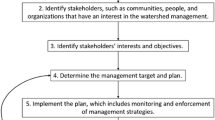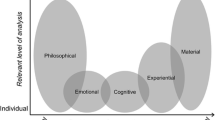Abstract
Sustainable management of coastal systems can only be achieved with an effective science-policy interface that integrates the three pillars of sustainable development: environmental protection, social progress and economic growth. The Systems Approach Framework (SAF) provides a structure to guide such a process by embracing the challenge of assessing complex systems for scenario simulations to support potential policy decisions. Based on applications of the SAF in six Baltic Sea case studies within the BONUS BaltCoast project, the SAF was revisited and further developed. Two additional steps were introduced partly to enhance implementation and decision validation and partly to facilitate the reiterative process with the addition of monitoring and evaluation. The SAF now includes six steps (Issue Identification, System Design, System Formulation, System Assessment, Implementation, Monitoring and Evaluation). A list of actions for each step clearly defines what needs to be done before progressing to the next SAF step. Activities within each step were improved to better integrate governance - citizen collaboration and improve the science-policy interface. Three auxiliary tools, developed in the BONUS BaltCoast project to support particular actions, were integrated in the different steps to facilitate application of the SAF by practitioners and scientists alike. The added focus on the stakeholder participation resulted in further actions being listed in the new steps to maintain stakeholder engagement and counteract stakeholder fatigue. The revised SAF is presented and discussed together with lessons learned from the different applications in five Baltic Sea study sites.








Similar content being viewed by others
References
Andersen SF (2016) A retrospective analysis of management of cormorants (Phalacrocorax carbo sinensis). Possible benefits of using System Approach Framework on a case of cormorants at Tofte Lake, Denmark. University of Copenhagen, Masters Thesis, 47 pp
Andersen JH, Axe P, Backer H et al (2011) Getting the measure of eutrophication in the Baltic Sea: towards improved assessment principles and methods. Biogeochemistry 106:137–156. https://doi.org/10.1007/s10533-010-9508-4
Ban NC, Alidina HM, Ardron JA (2010) Cumulative impact mapping: advances, relevance and limitations to marine management and conservation, using Canada’s Pacific waters as a case study. Mar Policy 34:876–886. https://doi.org/10.1016/j.marpol.2010.01.010
Basden A, Wood-Harper AT (2006) A philosophical discussion of the root definition in soft systems thinking: an enrichment of CATWOE. Syst Res Behav Sci 23:61–87. https://doi.org/10.1002/sres.689
Borja A, Elliott M, Uyarra MC, et al (2017) Bridging the gap between policy and science in assessing the health status of marine ecosystems, 2nd edn. Frontiers in Marine Science
Camilleri S, Pérez-Hurtado de Mendoza A, Gabbianelli G (2015) Multiple DPSI frameworks for support of integrated research: a case study of the Bahía de Cádiz Nature Park (Spain). J Coast Conserv 19:677–691. https://doi.org/10.1007/s11852-014-0347-7
Clark WC, Mitchell RB, Cash DW, et al (2002) Information as Influence: How institutions mediate the impact of scientific assessments on global environmental affairs. John F. Kennedy School of Government, Harvard University, Faculty Research Working Paper Series RWP02-044. https://doi.org/10.2139/ssrn.357521
Dinesen GE, Timmermann K, Roth E et al (2011) Mussel production and water framework directive targets in the Limfjord, Denmark: an integrated assessment for use in system-based management. Ecol Soc 16. https://doi.org/10.5751/ES-04259-160426
Dinesen GE, Neuenfeldt S, Kokkalis A, et al (2018) Cod and climate : a systems approach for sustainable fisheries management of cod ( Gadus morhua ) in coastal Danish waters. J Coast Conserv
Dutra LXC, Thébaud O, Boschetti F et al (2015) Key issues and drivers affecting coastal and marine resource decisions: participatory management strategy evaluation to support adaptive management. Ocean Coast Manag 116:382–395. https://doi.org/10.1016/j.ocecoaman.2015.08.011
EEA (1999) Environmental indicators : typology and overview. European Environment Agency (EEA) 25:19
Elliott M (2013) The 10-tenets for integrated, successful and sustainable marine management. Mar Pollut Bull 74:1–5. https://doi.org/10.1016/j.marpolbul.2013.08.001
Elliott M, Burdon D, Atkins JP et al (2017) “And DPSIR begat DAPSI(W)R(M)!” - a unifying framework for marine environmental management. Mar Pollut Bull 118:27–40. https://doi.org/10.1016/j.marpolbul.2017.03.049
Flannery W, Cinnéide MÓ (2012) Stakeholder participation in marine spatial planning: lessons from the Channel Islands National Marine Sanctuary. Soc Nat Resour 25:727–742. https://doi.org/10.1080/08941920.2011.627913
Folke C, Hahn T, Olsson P, Norberg J (2005) Adaptive governance of social-ecological systems. 30:441–473. https://doi.org/10.1146/annurev.energy.30.050504.144511
Franzén F, Kinell G, Walve J et al (2011) Participatory social-ecological modeling in eutrophication management: the case of Himmerfjärden, Sweden. Ecol Soc 16. https://doi.org/10.5751/ES-04394-160427
Gallagher A (2010) The coastal sustainability standard: a management systems approach to ICZM. Ocean Coast Manag 53:336–349. https://doi.org/10.1016/j.ocecoaman.2010.04.017
Gari SR, Newton A, Icely JD (2015) A review of the application and evolution of the DPSIR framework with an emphasis on coastal social-ecological systems. Ocean Coast Manag 103:63–77. https://doi.org/10.1016/j.ocecoaman.2014.11.013
Gillgren C, Støttrup JG, Schumacher J, Dinesen GE (2018) Working together: collaborative decision making for sustainable integrated coastal management (ICM). J Coast Conserv. https://doi.org/10.1007/s11852-018-0631-z
Halpern BS, Walbridge S, Selkoe KA, et al (2008) A global map of human impact on marine ecosystems. Science (80- ) 319:948–953
Hoffmann J (2009) Indicators for an ICZM. Experience with a problem-oriented approach. J Coast Conserv 13:141–150. https://doi.org/10.1007/s11852-009-0052-0
Hopkins TS, Bailly D, Støttrup JG (2011) A systems approach framework for coastal zones. Ecol Soc 16. https://doi.org/10.5751/ES-04553-160425
Hopkins TS, Bailly D, Elmgren R et al (2012) A systems approach framework for the transition to sustainable development: potential value based on coastal experiments. Ecol Soc 17:39
Inácio M, Schernewski G, Nazemtseva Y et al (2018) Ecosystem services provision today and in the past: a comparative study in two Baltic lagoons. Ecol Res 33:1255–1274. https://doi.org/10.1007/s11284-018-1643-8
Karnauskaite D, Schernewski G, Schumacher J et al (2018) Assessing coastal management case studies around Europe using an indicator based tool. J Coast Conserv. https://doi.org/10.1007/s11852-018-05797-x
Knecht RW, Archer J (1993) ‘Integration’ in the US coastal zone management program. Ocean Coast Manag 21:183–199. https://doi.org/10.1016/0964-5691(93)90026-U
Konstantinou ZI, Krestenitis YN, Latinopoulos D et al (2012) Aspects of mussel-farming activity in Chalastra, Thermaikos Gulf, Greece: An effort to untie a management Gordian knot. Ecol Soc 17. https://doi.org/10.5751/ES-04455-170101
Link JS (2018) Stability, and better. Fisheries 16:1–16. https://doi.org/10.1139/cjfas-2017-0250
Lopes R, Videira N (2016) A collaborative approach for scoping ecosystem services with stakeholders: the case of Arrábida Natural Park. Environ Manag 58:323–342. https://doi.org/10.1007/s00267-016-0711-5
Moksness E, Gjøsæter J, Lagaillarde G et al (2011) Effects of fishing tourism in a coastal municipality: a case study from Risør, Norway. Ecol Soc 16:24. https://doi.org/10.5751/ES-04290-160311
Mongruel R, Prou J, Ballé-Béganton J et al (2011) Modeling soft institutional change and the improvement of freshwater governance in the coastal zone. Ecol Soc 16:art15. https://doi.org/10.5751/ES-04294-160415
Næss LO, Bang G, Eriksen S, Vevatne J (2005) Institutional adaptation to climate change : Flood responses at the municipal level in Norway 15:125–138. https://doi.org/10.1016/j.gloenvcha.2004.10.003
Newton A, Elliott M (2016) A typology of stakeholders and guidelines for engagement in transdisciplinary, Participatory Processes 3:1–13. https://doi.org/10.3389/fmars.2016.00230
Olsen S, Tobey J, Kerr M (1997) A common framework for learning from ICM experience. Ocean Coast Manag 37:155–174. https://doi.org/10.1016/S0964-5691(98)80036-7
OutCoast (2014) ICZM Database. http://ec.europa.eu/ourcoast/index.cfm?menuID=4. Accessed 1 Apr 2018
Pinarbaşı K, Galparsoro I, Borja Á et al (2017) Decision support tools in marine spatial planning: present applications, gaps and future perspectives. Mar Policy 83:83–91. https://doi.org/10.1016/j.marpol.2017.05.031
Rassweiler A, Costello C, Hilborn R, Siegel DA (2014) Integrating scientific guidance into marine spatial planning integrating scientific guidance into marine spatial planning. Proc R Soc B 281:20132252. https://doi.org/10.1098/rspb.2013.2252
Reis J (2014) Introduction to systems approaches in coastal management-the legacy of the SPICOSA project. Mar Policy 43:1–2. https://doi.org/10.1016/j.marpol.2013.03.012
Robinson L (2002) Public outrage and public trust. http://www.enablingchange.com.au/Public_outrage_public_trust.pdf. Accessed 1 April 2018
Rozynski G, Bielecka M, Schoenhofer J (2019) Economic recovery of the Vistula Lagoon investigated with systems approach framework. Ocean Coast Manag Ocean and:90–102. doi: https://doi.org/10.1016/j.ocecoaman.2018.11.002)
Sandman P (1987) Risk communication: facing public outrage. US Environ Prot Agency J 13:21–22
Schernewski G, Baltranaitė E, Kataržytė M et al (2017a) Establishing new bathing sites at the Curonian lagoon coast: an ecological-social-economic assessment. J Coast Conserv:1–13. https://doi.org/10.1007/s11852-017-0587-4
Schernewski G, Bartel C, Kobarg N, Karnauskaite D (2017b) Retrospective assessment of a managed coastal realignment and lagoon restoration measure: the Geltinger Birk, Germany. J Coast Conserv 1–11. https://doi.org/10.1007/s11852-017-0496-6
Schernewski G, Schumacher J, Weisner E, Donges L (2017c) A combined coastal protection, realignment and wetland restoration scheme in the southern Baltic: planning process, public information and participation. J Coast Conserv 1–15. https://doi.org/10.1007/s11852-017-0542-4
Schernewski G, Friedland R, Buer A et al (2018a) Ecological-social-economic assessment of zebra-mussel cultivation scenarios for the Oder (Szczecin) Lagoon. J Coast Conserv. https://doi.org/10.1007/s11852-018-0649-2
Schernewski G, Inacio M, Nazemtseva Y (2018b) Ecosystem service assessment in coastal and marine planning and management: a Baltic case study. Front Environ Sci 6. https://doi.org/10.3389/fenvs.2018.00019
Schumacher J, Schernewski G, Bielecka M et al (2018) Methodologies to support coastal management - a stakeholder preference and planning tool and its application. Mar Policy 94:150–157. https://doi.org/10.1016/j.marpol.2018.05.017
Shipman B, Stojanovic T (2007) Facts, fictions, and failures of integrated coastal zone Management in Europe. Coast Manag 35:375–398. https://doi.org/10.1080/08920750601169659
Sorensen J (1997) National and international efforts at integrated coastal management: definitions, achievements, and lessons. Coast Manag 25:3–41
Stocker TF (2015) connections to equatorial South America (wetter and warmer in the west and drier in the east). Science (80- ) 350:764–766. doi: https://doi.org/10.1126/science.aac8720
Støttrup JG, Dinesen GE, Janssen H et al (2017) Re-visiting ICM theory and practice: lessons learned from the Baltic Sea region. Ocean Coast Manag 139:64–76. https://doi.org/10.1016/j.ocecoaman.2017.02.002
Teixeira H, Berg T, Uusitalo L et al (2016) A catalogue of marine biodiversity indicators. Front Mar Sci 3:1–16. https://doi.org/10.3389/fmars.2016.00207
Timmermann K, Dinesen GE, Markager S, et al (2014) Development and use of a bioeconomic model for management of mussel fisheries under different nutrient regimes in the temperate estuary of the Limfjord, Denmark. Ecol Soc 19. https://doi.org/10.5751/ES-06041-190114
Tönisson H, Kont A, Anderson A, Vilumaa K (2018) Application of system approach framework for coastal zone Management in Pärnu, SW Estonia. J Coast Conserv in review
Von Bertalanffy L (1968) General system theory. Georg Braziller New York 1:289
Wilson DC (2009) The paradoxes of transparency. MARE Publ Ser No 5 304
Acknowledgements
This work was mostly funded by the BONUS BALTCOAST project. BONUS BALTCOAST has received funding from BONUS (Art 185) funded jointly from the European Union’s Seventh Programme for research, technological development and demonstration, and from the Baltic Sea national funding institutions, InnovationsFonden, Denmark and the Federal Ministry of Education and Research of Germany (BMBF 03F0717A). We would like to thank our colleagues from BONUS BaltCoast for their input to testing and developing the SAF and supportive tools.
Author information
Authors and Affiliations
Corresponding author
Additional information
Publisher’s Note
Springer Nature remains neutral with regard to jurisdictional claims in published maps and institutional affiliations.
Rights and permissions
About this article
Cite this article
Støttrup, J.G., Dinesen, G.E., Schumacher, J. et al. The systems approach framework for collaborative, science-based management of complex systems. J Coast Conserv 23, 881–898 (2019). https://doi.org/10.1007/s11852-018-00677-5
Received:
Revised:
Accepted:
Published:
Issue Date:
DOI: https://doi.org/10.1007/s11852-018-00677-5




